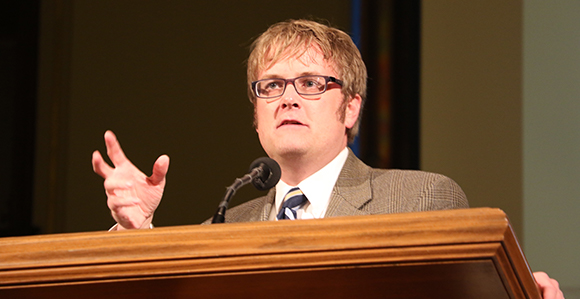Nauvoo Council of Fifty Championed Religious Liberty, Speaker Says
Contributed By R. Scott Lloyd, Church News staff writer

Matthew J. Grow, volume editor in the Joseph Smith Papers Project, speaks about the Council of Fifty in a lecture at the Assembly Hall on Temple Square November 10, 2016.
Article Highlights
- Church history figures supported civil and religious liberty.
- Joseph Smith and others believed that theocracy could be fused with democracy.
Related Links
In a time when Church leaders have focused on the urgent need to preserve and safeguard religious liberty in society, there are perhaps lessons to be drawn from the Nauvoo-era Council of Fifty minutes recently published by the Church Historian’s Press.
Matthew J. Grow, director of publications for the Church History Department and one of five volume editors of the recently released work, the latest publication in the Joseph Smith Papers Project, spoke November 10 in the Assembly Hall on Temple Square regarding the council minutes.
Much of his hour-long lecture focused on the ideas pertaining to civil and religious liberty as they were espoused by the Prophet Joseph Smith and the leading Brethren of the Church who served under his leadership on the Council of Fifty.
The council was established in part to discuss establishing a settlement for the Church outside the boundaries of the United States, with a new form of government the Prophet termed a “theodemocracy,” meaning government by God with elements of democracy.
Brother Grow referred to the abuses and oppression the Latter-day Saints had received from mobs with the approval or participation of state and local government officials in Missouri and increasingly in Illinois in the 1840s and 1850s.
“What I didn’t realize before I worked extensively with the records of the 1840s was how many attempts they made to obtain redress from the United States government or from the state of Missouri,” he said. “They tried all sorts of avenues to obtain redress through legal means. Those experiences left them deeply convinced of the inability and unwillingness of governments in the United States of that time to protect the rights of unpopular religious minorities.”
At that time, the Bill of Rights under the U.S. Constitution protected against abuses only by the federal government, he noted, not state or local governments. That meant that federal officials generally refused to intervene to protect rights at local levels.
By March 1844, when the Council of Fifty was established, opposition to the Church was growing in and around Nauvoo.
“Members of the council were thus drawn to the possibility of relocating significant numbers of the Mormons outside of the United States, where they could create their own government, and to the possibility of creating a better government within the United States,” Brother Grow explained.
Not receiving satisfactory answers from candidates for U.S. president, the council determined to foster the campaign of Joseph Smith.
“They’re pursuing both [ventures] simultaneously: the presidential campaign and the idea of settlements outside the United States,” Brother Grow said.
For most contemporary Americans, theocracy was a dirty word, he observed, as it connoted tyrannical rule by religious leaders.
“But Joseph Smith and other council members believed that theocracy could be fused with the best elements of democracy, a system that Joseph Smith publicly described during his campaign as ‘theodemocracy.’
“They believed that such a system would protect minority rights against the majority; that it would allow for dissent, free discussion; that it would involve Latter-day Saints and others; and that it would increase righteousness.”
Such a form would serve as the government of the kingdom of God, “perhaps before, but certainly after the Second Coming of Jesus Christ,” he said. In the view of Joseph and other council members, “not all good men and women before the Second Coming or during the initial stages of the Millennium would be Church members. They emphasized that everyone would enjoy religious liberty in the kingdom of God. In fact, Joseph invited three men who were not members of the Church to join the council to demonstrate that in the Kingdom of God a man’s religious sentiments would not come into play in politics and that there would be equal rights for all.”
